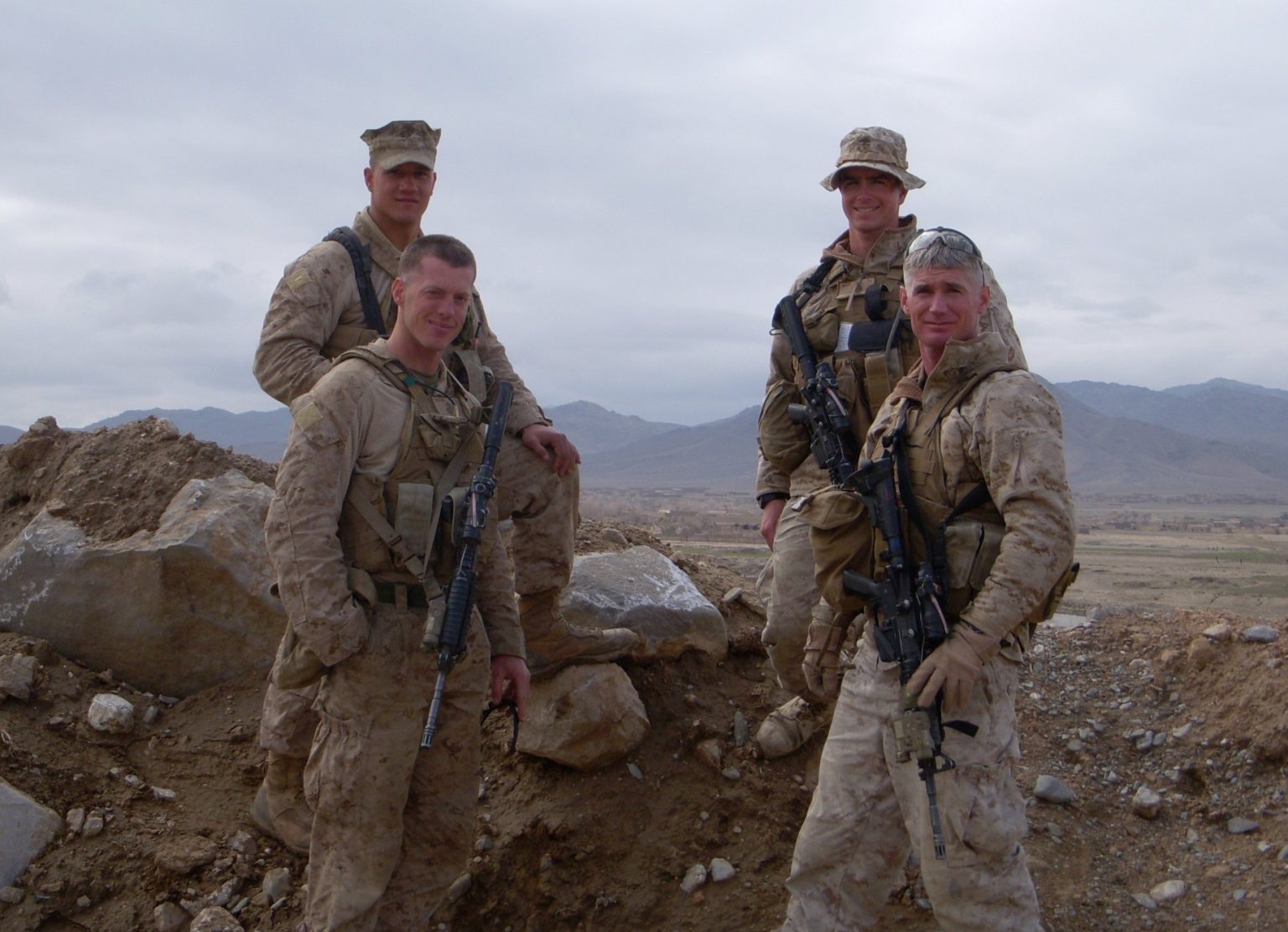Summarize this content to 2000 words in 6 paragraphs
Emery Wager, back right, with fellow U.S. Marines during one of his tours of Afghanistan. (Photo courtesy of Emery Wager)
[Editor’s note: “Tech Vets: Profiles in Leadership and Innovation,” is a new GeekWire series showcasing U.S. military veterans leading companies within the Pacific Northwest tech industry. The series explores how military experience fosters leadership, resilience, and innovation in tech.]
Emery Wager was on a defined path from an early age to go to the best schools, land the best possible job and make a career for himself.
That path even started with an entrepreneurial venture at age 9, when Wager, who grew up in the shadow of Seattle’s Husky Stadium, and a friend created a business called Woof Cookies. The nonprofit started by selling bone-shaped purple-frosted cookies to tailgating University of Washington football fans, grew in size over 10 years and eventually donated $32,000 to Seattle Children’s Hospital.
Wager went on to attend Lakeside School and then Stanford University before landing a job as a mechanical engineer at a medical device startup in Silicon Valley. But after less than a year, a conversation with a friend from Stanford who was joining the Marine Corps changed the trajectory of Wager’s life.
“I had this aha moment like, ‘Dude, I can do that,’” Wager told GeekWire. “I don’t have to do this one thing. And that was a major turning point for me in my life.”
The surprise decision in 2008 came as a shock to Wager’s family, and in hindsight he probably would have communicated his plans a bit differently. With U.S. involvement in Afghanistan re-ramping up, as Wager put it, he was intrigued by the idea of being the first person, or in the first group of people, that someone from Afghanistan met.
“It was really about that unique ambassador role that only someone from the military can really play in a dangerous environment. I wanted it to be me,” Wager said.
In his four years in the Marines, Wager graduated from Officer Candidate School, The Basic School, and Infantry Officer Course. He rose to infantry platoon commander, leading more than 60 Marines through counterinsurgency operations in Helmand Province, Afghanistan. As an infantry company executive officer he was second in command of a 180-member-strong Marine infantry company during eight months of training and a seven-month deployment.
Wager was awarded the Navy and Marine Corps Achievement Medal for his actions in the planning and execution of offensive operations against the enemy.
Confido Legal CEO Emery Wager. (Photo courtesy of Emery Wager)
When Wager did leave the Marines he had to solve the problem of what to do next. He’d grown accustomed to and enjoyed the leadership aspect of his service, and he landed at Seattle’s Gravity Payments, a credit card processing and financial services startup where he spent nine years.
One of his side roles at Gravity was managing the relationships the company had with various law firms. He dug in and learned about the unique rules of professional conduct that govern how money is handled in the business of law. And he and a team inside Gravity set out to build a tool to better handle legal financial transactions.
Confido Legal spun out of Gravity and is now a separate company that Wager leads as CEO. The startup, which raised $2 million in seed funding, has two levels of clients: law firms that can log directly into Confido’s application and manage money in a compliant manner, and legal tech companies that want to build integrated payment and finance features into their applications.
The company now processes several hundred million dollars a year in payments for the legal sector.
“It’s interesting building a startup,” Wager said. “Trying to find product market fit didn’t really draw much on military experience. But every day as our business grows and becomes more complex and we bring on more employees, I find that that experience is now more and more relevant.”
Even though Confido only employs 10 people right now, Wager reflects on being a 24-year-old who was previously in charge of 60 people. And he’s drawing on critical lessons from his time as a Marine.
“One of the biggest [lessons] for me is the concept of going to the point of friction,” Wager said. “A lot of people think, as an organization grows, a leader is supposed to sit back and look at the ‘battlefield’ as a whole.”
But Wager said that what he was taught as a military leader was to attack a hill or breach some barbed wire with his team to make sure the exercise happened the right way. He takes that mentality into practice at Confido, imparting his leadership skills onto an individual project to convey that it’s a critical mission for the company.
“I feel like I’m pretty good at pretending whatever I’m doing at that moment is a life or death situation,” Wager said.












